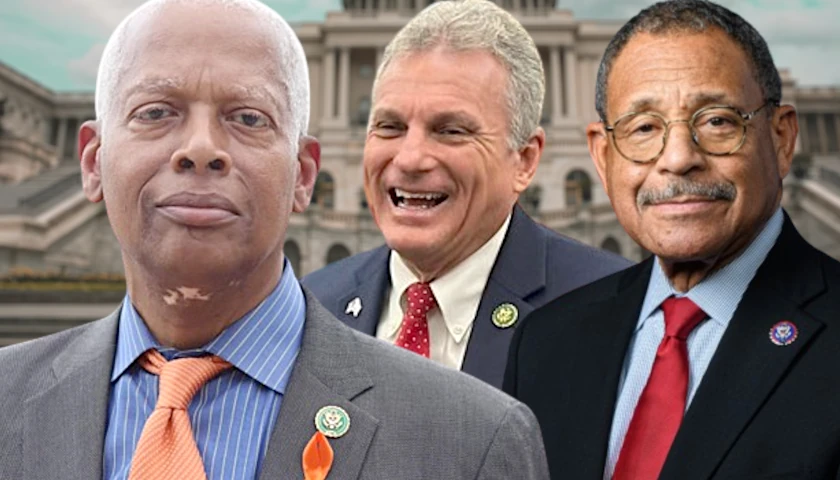by Elyse Apel
Thirteen of 14 incumbents representing Georgia in the U.S. House of Representatives have leads in fundraising with 101 days to go.
None of the seats occupied by nine Republicans and five Democrats are forecast to impact the party majority in the chamber.
The latest campaign deadline, June 30, shows some insight into the latest financial status of these races, where the money tends to follow the incumbents.
In District 1, Republican Earl Carter has served in the U.S. House since 2015. He went unchallenged in his primary, but will face Democrat Patti Hewitt.
Since he declared his campaign in 2023, Carter has raised nearly $2 million, spending $1.1 million. Hewitt raised only $32,000 over that same period, spending $25,000 of that.
Democrat Sanford Bishop Jr. is the incumbent in District 2, first elected to the position in 1993. His opponent is A. Wayne Johnson, who formerly worked in Trump’s administration, and handily won the spring primary.
Bishop Jr. has brought in $1.4 million, spending $900,000. Only $540,000 of the $1.4 million was from individual donations, the rest coming from committee contributions.
Johnson raised nearly $100,000, spending all but $10,000.
District 3 is the only district without an incumbent running. There, Republican Brian Jack has raised $1.72 million more than his Democratic opponent Maura Keller.
In the first six months in 2024, Jack’s campaign brought in $1,776,507. Over that same period, Keller’s campaign totaled $49,458. Yet, Jack’s campaign ended the period with $269,000, while Keller ended the period in the red, with $8,000 in the bank and owing $27,000.
Hank Johnson, a Democrat, is the incumbent in District 4. Johnson has held the seat since 2007 and faces off against political-newbie Eugene Yu.
Johnson’s campaign has brought in $470,000, spending nearly all of that with expenses totaling $430,000.
Yu’s campaign brought in a small fraction of that amount, raising only $40,000 and spending $12,000.
District 5 is also held by the Democrats, with incumbent Nikema Williams seeking another term since first assuming office in 2021. Republican John Salvesen is opposing her.
Williams received $720,000 in donations, already spending all but $60,000. The Center Square could not obtain reports from the FEC on Salvesen’s financial status.
Democrat Lucy McBath is the incumbent in District 6, facing off against Republican Jeff Criswell. McBath has been in office only since 2023, while this is Criswell’s first foray into politics.
The funding has poured in for McBath, who has raised $1.9 million. She has spent $1.5 million, while Criswell has raised only $21,000.
Rich McCormick is the Republican incumbent for District 7, challenged by Democrat Dob Christian. McCormick assumed office in 2023 and has raised $1.6 million, spending $1.3 million. Christian has brought in only $16,000.
In District 8, Republican Austin Scott is the incumbent, first elected in 2011. He went unchallenged in the spring primary. Scott has brought in $900,000 and spent nearly $700,000.
Democrat Darrius Butler raised only $12,000.
Republican Andrew Clyde is the incumbent in District 9, challenged by Democrat Tambrei Cash. Clyde assumed office in 2021 and raised nearly $400,000, spending $340,000 of that. Cash’s campaign brought in $42,000 and spent $35,000.
In District 10, Republican incumbent Mike Collins went unchallenged in his primary, after first taking office in 2023. Democrat Lexy Doherty won her primary against fellow Democrat Jessica Fore.
Collins ended the period with $551,000 cash on hand, after raising $1.3 million and spending $900,000. Doherty raised $31,000 and had less than $1,000 left.
Republican incumbent Barry Loudermilk is out-fundraising his opponent Katy Stamper by hundreds of thousands of dollars in District 11. First entering office in 2015, Loudermilk raised $622,000 and ended June with just over $300,000 in the bank.
Stamper’s campaign only brought in $28,000 and ended with $600.
Republican Rick Allen raised $960,000, despite the incumbent having no challengers in the District 12 primary. His opponent, Liz Johnson, brought in only $11,000.
Allen, who assumed office in 2015, still ended the period with over $1 million in the bank.
David Scott, a Democrat serving District 13 since 2003, faced six challengers in the spring primary. He won with just over 50 percent of the vote, also bringing in just over $1 million.
Yet, he spent $1.3 million, ending with just $260,000 on hand.
Jonathan Chavez is the Republican challenging Scott. The Center Square could not obtain reports from the FEC on Chavez’s financial status.
In the final district in Georgia, Democrat Shawn Harris faces off against Republican incumbent Marjorie Taylor Greene.
Greene took office in 2021 and has since sealed her place in the Republican Party. She raised $6.3 million, in contrast to Harris’ $522,000.
Since January 2023, Greene has spent $7.2 million. She ended the period with just over $1 million on hand, while Harris had $104,000.
– – –
After completing an internship in 2023, Elyse is returning to The Center Square’s apprenticeship program, serving as the elections reporter across North Carolina and Georgia. A graduate of Hillsdale College, Elyse’s writing has been published around the country in a wide variety of publications from the “Washington Examiner” to “The American Spectator” and “The Daily Wire.”
Photo “Hank Johnson” by Congressman Hank Johnson. Photo “Earl Carter” by Congressman Buddy Carter. Photo “Sanford Bishop Jr” by Congressman Sanford Bishop. Background Photo “U.S. Capitol Building” by Oljamu.









